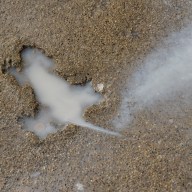 John Lennon’s only acting gig outside the Beatles movies was Richard Lester’s satirical “How I Won the War.”
John Lennon’s only acting gig outside the Beatles movies was Richard Lester’s satirical “How I Won the War.”
The 8th of December is the day, in 1980, John Lennon was gunned down by deranged fan Mark David Chapman. Lennon, like the Beatles, has been examined every which way, even idolized in a way that sands over his rougher edges. But there are plenty of Lennon ware that gets ignored: many of his solo albums; his by-many-accounts unlistenable (but maybe not!) art records with Yoko Ono; the couple’s far more approachable avant-garde films, like the searingly unpleasant “Rape”; his books, packed silly with aggressive wordplay.
And then there’s his acting. We don’t mean “A Hard Day’s Night” and “Help!” (Both are classics, although there’s an argument to be made that “Help!” is even better. It’s goofier and its absurd sense of humor, while more director Richard Lester and writer Charles Wood than the Beatles, anticipates the likes of Monty Python.) We mean the only film in which he didn’t play himself (or “himself”).
That would be “How I Won the War,” made in 1967. A dense, kaleidoscopic and bracing satire, it was once again made by the team of Lester and Wood. Lester was a poppy stylist who married fast paced imagery — he was called “the grandfather of the music video,” over which he half-jokingly asked for a blood test — to a bemused and skeptical worldview. Wood was, like Lennon, an incorrigible wordsmith. He and Lester, who had invented a new, faster brand of film comedy, were perfect together.
Despite dominating its advertisements, Lennon is only a supporting player in “How I Won the War.” (The lack of a big role did free him up to write “Strawberry Fields Forever” while on location.) The lead is played by Michael Crawford, the future Phantom of the Opera who at that point was a go-to bumbling, stammering, pratfalling man-child. (That’s the role he played in Lester’s “The Knack,” which won the Palme d’Or in 1965. Eerily, that film is set on December 8.) The film was based on a satirical novel by Patrick Ryan, but Lester and Wood went father into absurdism than did Ryan. Here, Crawford’s obliviously proper Lieutenant takes his troops, all of who hate him, to North Africa on the necessary mission to set up a cricket pitch.
The plot is beyond loose, there to buttress a frankly exhausting stream of gags and Brechtian devices. The film repeatedly calls attention to itself. Actors, among them Lennon’s Gripweed, address the camera. The antics of the token clownish troop (Jack MacGowran) — who, as it’s gradually revealed, is actually totally insane — sometimes get fitted with a laugh track, decades before Oliver Stone did the same thing in “Natural Born Killers.”
Other gags aren’t so upbeat. One poor troop keeps cheerfully announcing to the camera “I die in North Africa!”; when he does, it’s unexpectedly devastating. In the most ghoulish running joke, soldiers that die are suddenly replaced by mute, purely work-driven soldiers who are painted a single color, like lifesize, animated toy soldiers. They’re mementos of the departed, forcing us (but not the characters) to remember they’re gone.
By “How I Won the War,” made two years after “Help!”, Lester was becoming increasingly serious. His subsequent film would be the emotionally gutting (though still fast and dense and funny) “Petulia,” a Summer of Love summation with career peak work from Julie Christie and George C. Scott. “How I Won the War” is incredibly angry, and its humor is sarcastic, strident and not always intentionally funny. The film is wearying in spots, but that’s as it should be.
Lester has spoken about how he wanted to make a film that was truly anti-war. Most anti-war films, he charged (as did Francois Truffaut), still made battles look fun and adventurous. “How I Won the War” features none of this, and even includes quotes on the soundtrack from the score to “Lawrence of Arabia.” The battle scenes are hectic and crazy and wholly lacking in comedy. Lester tints the screen a bold color, and we wait for the madness to end and the colors to return to normal. (Some prints go black-and-white.)
The final battle even features a moment even more chilling than its makers could have imagined. Lennon’s character is fatally wounded. He drops to the ground and, still alive and lucid, stares into the camera. “I knew this would happen. You knew it would happen, didn’t you?”
Luckily, the only way to see “How I Won the War” is on Vudu. Netflix has shuffled it off of their Instant service, so you can rewatch “Orange is the New Black” for the third time.
















